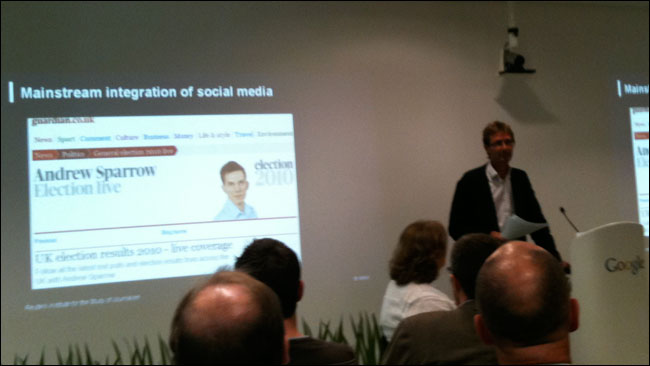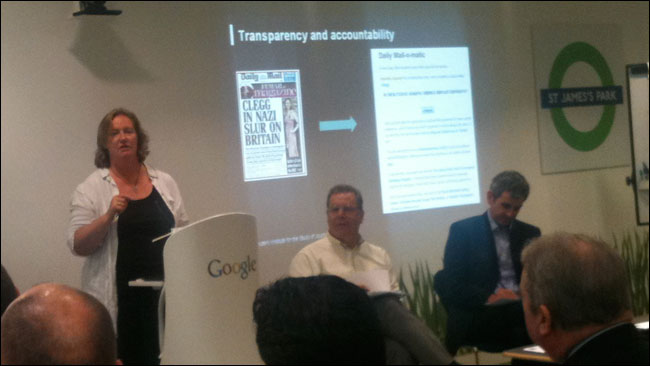Nic Newman, Emily Bell and Peter Barron discuss "#UKelection2010, mainstream media and the role of the internet"
As I mentioned earlier in the week, on Tuesday I went to the launch of Nic Newman's Reuters Institutes for the Study of Journalism paper: "#UKelection2010, mainstream media and the role of the internet". The evening consisted of a panel session featuring Nic, Emily Bell and Peter Barron.
Some of the key points that Nic outlined from his paper included:
- This was the first UK election where the general population had the tools to talk in an unmediated way on a massive scale.
- That whilst the TV debate was experienced by many people as a linear event, the back-channel on Twitter provided a running commentary on what was taking place.
- The best of the social media - jokes, spoof posters, reaction on Twitter - was reflected and amplified by the mainstream media.
- This ultimately influenced the behaviour of the politicians. David Cameron, for example, toned down his habit of citing anecdotal stories of people he met after it was spoofed online.
- Experienced journalists like Jon Sopel found it speed up the news cycle - via Twitter he was able to follow the commentary of someone like Paul Waugh of the Standard without having to wait for the next day's papers.
- Live blogger Andrew Sparrow scored more unigue users than The Guardian sold papers on the day after the election.
- William Hague announcing he was about to go back into negotiations with the Liberal Democrats via Twitter suggested the service was beginning to be used as 'a political newswire'.

Emily Bell on 'now' and 'forever'
Emily Bell spoke about how the rise of the real-time web had shaken media and publishing organisations. She argues that 'now' has become literally 'now', and that forever on the web remains forever, meaning that there is a huge stretch on resources. To credibly cover the election, organisations had to be on Twitter and reflecting what was happening on Twitter, whilst also investing in the time consuming data-driven applications that mapped the election forever. She worried that there was a danger that the traditional 500-750 word piece of newspaper analysis, despite having value still, is getting lost in that spectrum.
She felt that one of the galvanizing effects of the campaign had been that, because decisions had to be made quickly, some of the agonising and internal debates that would have taken place in the traditional newsroom about using social media tools were swept away. There simply wasn't time to have them.
Emily Bell also made the point that it felt like in terms of using these new media tools, the audience were moving at 100mph, media organisations at 50mph, and politicians at 10mph. Whilst citing exceptions like Tom Watson, John Prescott and Lynne Featherstone, Emily said she felt that 85%-90% of politicians were still in 'broadcast representation' mode, rather than 'participatory democracy' mode - which seems to be what a good proportion of the electorate are now expecting.
Search behaviour mirrors the national interest
Google were hosting the evening in their London HQ, and their Head of Communications and Public Affairs Peter Barron spoke about some of the things the search giant had noticed during the election. He argued that something that symbolised the failure of the Conservatives to make a decisive breakthrough was that searches for Nick Clegg peaked each time there was a TV debate, searches for Gordon Brown peaked when he insulted 'that woman', and searches for David Cameron didn't peak.
He also showed a chart illustrating that the day after the election, searches for the phrase 'hung parliament' dwarfed those for Britney Spears. Some of those in the audience were unimpressed by this, but having seen Professor Karen Spärk Jones bemoan that her entire life's work in information retrieval had been reduced to people typing 'Britney Spears' into web search engines, I'm aware that topping queries for her is a major achievement for an obscure phrase.
A more engaged electorate
Encouragingly, Nic's research suggests that the notoriously difficult to reach age group of the 18-24 year olds seemed to be more interested politically - 81% of them said they felt engaged with the campaign. As Emily Bell put it:
"All you need now to be politically active is a Facebook account. Are political parties, and the media, ready for that?"
One of the questions from the floor was whether they would stay engaged - and Nic Newman pointed out that this rather depended on what happened with the political parties. People need something to be engaged with. It remains to be seen whether the major parties will continue with digital campaigning, or whether, rather like leaflets, we will see a lot of them at election time and not much in between.

You can download Nic Newman's paper as a PDF here: #UKelection2010, mainstream media and the role of the internet: how social and digital media affected the business of politics and journalism.
Do we really believe that
I have a colleague who knocked on doors on election day to remind people to vote, only to be told at one household not to worry because they had all voted on Facebook already. He couldn't persuade them to come out and vote at the "real world" polling station though!
Facebook and other social networks may sometimes be successful in generating debate and sharing ideas but most Facebook groups, online petitions and similar should be seen as potential gateways into political activity rather than evidence of activism themselves.
hahaha, unbelievable...well no its not in todays society. Facebook is the world to some people. Quite sad to be honest. I think the web played a good debating couldren but i think somethings have and were overly discussed.
I think the point that Emily was making was that the barrier to entry into a political campaign had been drastically reduced from the days when you had to go out on the doorstep or go to meetings or photocopy leaflets.
Definitely. One of the things that came out in the debate was the issue of knowing what to ask your followers to do if you could get to them via social media. Getting them to change their Twitter avatar was unlikely to swing votes. Getting people to pledge time or money does.
It isn't so much enhancement of participation that's so vital in Britain today, it's having more than three major parties that should be the long term goal. One which sadly is unattainable with the current electoral system. People if they want to engage in politics and make themselves heard in whatever sphere they choose have gotten by doing that for a long time. Just because there's a Twitter-type easy invention and some fancy new tech at each passing election doesn't change things all that significantly.
Fact is that on the continent we've nations with between 5 and 12 major parties, representing much of the spectrum politically. The left wing, which died about 20 years ago in Britain, is alive and well in Europe but somewhat marginalized by the prevailing Western ideology right-wing neoliberalism. Nations like in Germany or Denmark or Norway are ample proof of this as healthier nations where there is actually something credible and influential for nearly everyone to vote for.
Fact is that we're close to the USA in that for all the profligate participation we can't even support a wide spectrum; we've three right-wing outfits without near as much as was between them 30 years ago. You can participate all you want, but it won't have an impact on the ideology of the rulers over in Parliament. That's why initiatives that do change things like the Pirate Party happen in Scandinavia whilst the UK Pirate Party hasn't got a chance of being considered more than a club of eccentrics by the occasional hack bored enough to do a write-up on them.
Half of me is amazed that someone could deadpanly say that they voted on facebook so it's ok, and the other half just shakes my head knowing that there's a lot more of these folks then our deepest nightmares can imagine. Just unreal.